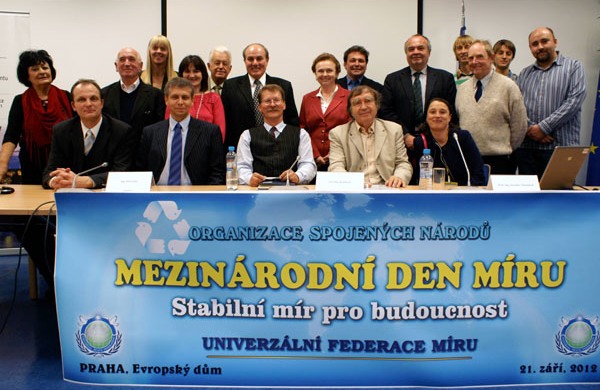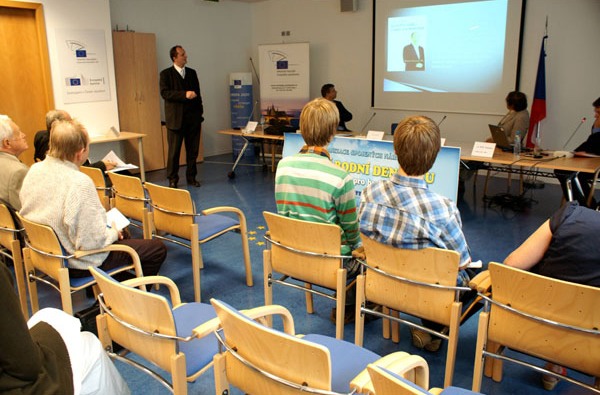![]()
The Words of the Samochin Family
|
|
The Words of the Samochin Family |

Prague, Czech Republic -- To commemorate the UN International Day of Peace, a UPF conference under the title "Sustainable Peace for the Future" was held in Prague on September 21. The conference was convened in the European House. The 25 participants represented the fields of academia, local and European politics, and NGOs.
The conference was moderated by Mr. Petr Samochin, UPF representative in the city of Brno. In his opening speech he welcomed all the participants and outlined the basic principles of the UPF. Afterwards, the participants watched the video "Quest for Peace" introducing the activities of the UPF and its founder, Rev. Dr. Sun Myung Moon. In honor of the memory of his recent decease all the present stood up and observed a minute of silence.
The topic of the first panel was "Principles of Peace." Mr. Jaroslav Fuchs, a philosopher, spoke about peace from the viewpoint of contemporary philosophy. He explained the conditions and prerequisites under which peace can be realized. In his speech, Mr. Fuchs spoke about human identity formed by our culture, moral egoism, ethical relativism, and multiculturalism in regard to fundamentalist groups.
Next Mrs. Erika Lajdová read a written contribution of Dr. Michal Broža, Director of the UN Information Center in Prague. This paper is available on the website www.osn.cz under the title "Sustainable Peace for a Sustainable Future." It summarizes and emphasizes the approaches and ways in which UN helps build a world of peace.

In the second panel Jaroslav Doubrava, a member of the Senate, the upper chamber of the Czech Parliament, spoke on the topic "Human Security and Sustainable Peace." He highlighted the value of human life and expressed his support for all initiatives that contribute to world peace. He said that "war is always a bad solution." Then he shared his personal experiences during the war in Yugoslavia, in particular in Belgrade, Serbia. He spoke about the international conference against nuclear armaments in which he participated, noting that some 800 nuclear tests have harmed the lives of newborns. Mr. Doubrava mentioned that humanity invests much more money in destruction rather than improving conditions and enabling people to live better. He also emphasized the role of NGOs in promoting peace and the long-term ineffectiveness of violent methods to enforce peace.
After a short break, the program continued with a panel on "A New Vision and the Role of Peacemakers in History." Mr. Petr Leba, UPF representative in the city of Pilsen, spoke about Mahatma Gandhi and Martin Luther King, Jr., as notable peacemakers of the 20th century. He explained the motivation and methodology of these peacemakers in promoting peace and reconciliation in their sphere of influence.
The second contribution of this panel was a tribute to Rev. Moon entitled "Life for World Peace." Mr. Martin Slezák introduced the autobiography of the UPF founder and describes his efforts to create world peace. Throughout his life, Rev. Moon persevered without interruption or change of direction towards the realization of his vision – creating a world of peace. Mr. Slezák mentioned the origins of the controversy and gossip about Rev. Moon as a person and about his movement and stated that through the international marriage blessings, conferences, NGOs and many other activities he has changed the lives of people for the better. International marriages create bridges between races, religions, nations, and cultures. His NGOs are active in most countries of the world. Tens of thousands of Ambassadors for Peace around the world create an atmosphere of cooperation. The contribution finished with a clear hope for the realization of world peace.
In the final panel entitled "Multiculturalism," the first paper was presented by Professor Jaroslav Machácek, Ph.D. He spoke on the topic "The Impact of Migration on Multiculturalism." Professor Machácek mentioned the history of migration from antiquity to modern times, giving examples from Switzerland, Canada, and the USA. He introduced two ways of fostering multiculturalism: either through assimilation (France, Netherlands, Scandinavia) or discriminatory measures (Germany, Austria, Switzerland). He mentioned the statements by some politicians in 2011 that multiculturalism has failed. Professor Machácek ended with many concrete examples and data regarding migration within Europe and the world.
The last presentation of this panel and the whole conference was given by Mr. Jaromír Kohlícek, a member of the European Parliament. He emphasized the need for specific practical experiences with people in various places in the world. He shared some personal experiences with minorities which fostered a spirit of multiculturalism. He mentioned many cases and his own personal experience which cannot be represented by statistics. He presented also various comparisons.
During the final discussion, Professor Machácek mentioned the essay "Nežít se lží" (Live Not by Lies) by Alexander Solzhenitsyn in connection with other examples of peacemakers. Mr. Kohlícek highlighted the need to educate youth about the value of assertiveness instead of aggression and respect for parents and teachers. He encouraged greater education and encouragement for mothers, who create the family environment, because they can have the best influence on that how the world will look like in the future.
Organizers praised the depth, objectivity, and efforts of the speakers to connect their presentations with the reality of daily life, from the personal level to international vision and policies. They hope to host similar conferences in the future.